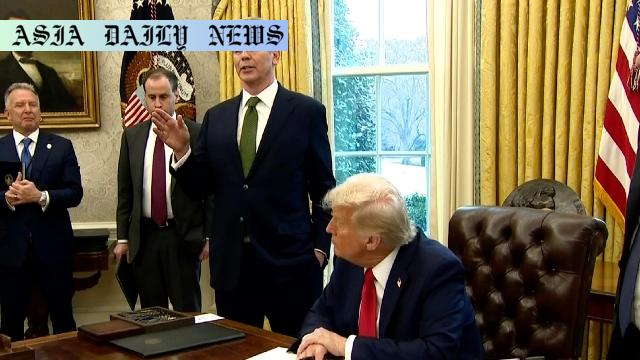Tariff Moratorium: Trump extends tariff deadline following Treasury Secretary Scott Bessent’s advice on securing critical trade deals.
Key Point 1: Trump extended his self-imposed tariff moratorium deadline to August 1 based on Scott Bessent’s advice.
Key Point 2: Treasury Secretary Bessent highlighted how more time would enable trade deal progress with partners like the EU and India.
Key Point 3: The decision emphasizes trade consensus over abrupt economic actions that could destabilize global markets.
Key Point 4: This strategic pause supports dialogue in global tariff-related negotiations, highlighting its potential outcomes.

Trump’s Decision to Extend the Tariff Moratorium
President Donald Trump’s recent decision to extend the self-imposed moratorium on reciprocal tariffs marks a crucial trade and economic policy decision. Originally set to conclude on July 9, this pause has been extended to August 1 following the advice provided by Treasury Secretary Scott Bessent. According to a report published in The Wall Street Journal, the extension reflects a shift from abrupt tariff implementations to a more calculated, negotiation-based approach.
The initial 90-day moratorium enacted in April incited concerns worldwide. While global markets reacted with unease, Bessent successfully persuaded the President to delay further tariff actions. Fast forward to this week, Bessent once again highlighted the steady progress being made in bilateral and multilateral discussions with trading nations in the EU and India, among others. He emphasized how extra time could create the right circumstances for clinching deals that could potentially minimize global tariff wars, promote mutual economic gain, and stabilize transatlantic or cross-Pacific trade relationships.
This decision exemplifies Trump’s often spontaneous yet calculated decision-making style. Spending the weekend at his New Jersey golf retreat, Trump contacted several allies and decision-makers before signing the executive order delaying the official tariff deadline. By signaling patience, the President aims for significant, bilateral breakthroughs rather than impulsive tariff implementations, which while protective on paper, may harm broader economic systems in practice.
Bessent: The Key Adviser Steering Trade Talks
Treasury Secretary Scott Bessent has emerged as a pivotal aide and strategist in Trump’s economic policy deliberations. His role extends beyond providing timely advice; he is actively involved in negotiations and in grounding executive choices in data, research, and stakeholder inputs. Multiple sources confirm that Bessent’s efforts to secure UN-based deadlines have drained mounting tension between the United States and several competitors—especially on retaliatory tariff-related disagreements.
What sets Bessent apart is his ability to convey the intricacies of trade consensus-building to the President. Global trade negotiations often require protracted dialogues, subtle compromises, and synchronized outputs. Short timelines can trigger seismic shifts, upending years of progress and causing diplomatic fallout. In light of this reality, Bessent underscored how ratifying negotiations instead of escalating to “tit-for-tat” tariffs could result in measurable advantages, particularly for complex economies like those of the U.S. or China.
One can attribute the effectiveness of the recommendation to Trump’s positive history with the Treasury adviser. While Trump remains well-known for pragmatically opposing ideas to field-test their validity, his track-recording appreciation for team members—willing to both challenge the canon and chart hybrid outcomes—resonates powerfully here. Should all associated states align timely thus, favorable bilateral accordonomies (e.g. mutual multistakeholder optimator, diversion best trainings)



Commentary
The Significance Behind Trump’s Decision
President Trump’s decision to extend the tariff moratorium deadline requires careful examination. Deliberately choosing dialogue over aggression in international trade is rare for an administration that touts protectionism heavily. However, by prioritizing strategy and teamwork, this move sends a broader, unmistakable message: calculated diplomacy remains on the table. Although he originally appeared set to end the extension arbitrarily by week ending indexes, –paradoxical approaches’